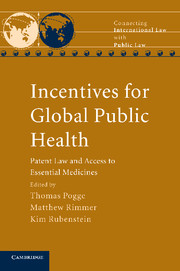Book contents
- Frontmatter
- Contents
- Contributors
- Series Editors' Preface
- Editors' Preface
- Introduction: Access to essential medicines: public health and international law
- Part I International trade
- Part II Innovation
- 5 The Health Impact Fund: better pharmaceutical innovations at much lower prices
- 6 The Health Impact Fund: a critique
- 7 A prize system as a partial solution to the health crisis in the developing world
- 8 Innovation and insufficient evidence: the case for a WTO–WHO Agreement on Health Technology Safety and Cost-Effectiveness Evaluation
- Part III Intellectual property
- Part IV Healthcare
- Bibliography
- Index
- References
6 - The Health Impact Fund: a critique
Published online by Cambridge University Press: 04 August 2010
- Frontmatter
- Contents
- Contributors
- Series Editors' Preface
- Editors' Preface
- Introduction: Access to essential medicines: public health and international law
- Part I International trade
- Part II Innovation
- 5 The Health Impact Fund: better pharmaceutical innovations at much lower prices
- 6 The Health Impact Fund: a critique
- 7 A prize system as a partial solution to the health crisis in the developing world
- 8 Innovation and insufficient evidence: the case for a WTO–WHO Agreement on Health Technology Safety and Cost-Effectiveness Evaluation
- Part III Intellectual property
- Part IV Healthcare
- Bibliography
- Index
- References
Summary
Introduction
Despite the remarkable ability of medical science to treat, cure and prevent human suffering, the reality is that relatively few people benefit from this knowledge. The principal reason is poverty, or more accurately the unequal distribution of wealth. While the rich have more than enough to afford complex new treatments for cancer, heart disease, diabetes and infertility (amongst many other disorders), the poor struggle to afford even the most basic healthcare services. And while the diseases of the rich present lucrative new markets for medical research, the diseases of the poor are largely invisible to profit-oriented scientists, so few drugs are available. These two problems have been dubbed the crises of access and innovation.
The patent system, although significant for the economic sustainability of medical science, has exacerbated these problems. The strongest justification for the patent system is utilitarian. The argument is that in return for investing in the risky business of developing an invention and disclosing it to the public, the inventor is given up to twenty years of exclusivity during which they have the sole power within the jurisdiction of the patent to exploit the invention, or to license others to do so. This is the foundation for a very flexible business model, wherein the patent owner can decide how they market their invention, whether and how they will invest in additional work needed to ready it for commercial use, whether they will keep the invention for their own sole use or allow other parties to use it and, if the latter, the price they will charge.
- Type
- Chapter
- Information
- Incentives for Global Public HealthPatent Law and Access to Essential Medicines, pp. 155 - 180Publisher: Cambridge University PressPrint publication year: 2010
References
- 2
- Cited by



